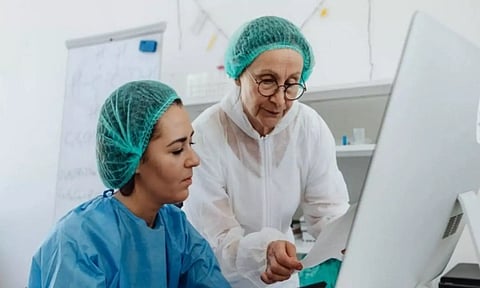

LONDON: A team of scientists led by UCL academics has found new ways for predicting outcomes in pregnancies in which the baby is not developing normally inside the womb.
The EVERREST Prospective Study comprised 142 women with severe early-onset foetal growth restriction (FGR), which meant their babies were very little on ultrasound images between 20 and 27 weeks of pregnancy, according to the study, which was published in the Journal of Clinical Investigation.
Fetal growth restriction affects approximately 60,000 babies per year in Europe and the USA.
Some babies with FGR continue to grow and are born around their due date. However, many will either need extreme preterm delivery (before 28 weeks of pregnancy) or will not survive the pregnancy, resulting in stillbirth.
In England alone, it is estimated that the annual total costs of neonatal care are Pound 262million.
Lead author, Dr Rebecca Spencer (UCL EGA Institute for Women’s Health and University of Leeds), said, “There is currently a lot of uncertainty for the families of unborn babies with early-onset fetal growth restriction and for their health-carers.
“We want to give them a better idea of what to expect if they are affected – as many people find uncertainty harder to cope with than definite bad news.
“Predicting pregnancy outcomes may also help doctors decide how often to do ultrasound scans and when to give antenatal steroids to prepare the baby for preterm delivery.”
Results were analyzed for 123 women who had provided blood samples and had regular ultrasound examinations of their baby’s size and well-being.
First, researchers measured the levels of 102 proteins in blood samples from 63 women and combined this with the ultrasound measurements to build statistical models that could predict pregnancy outcomes.
The team asked both women and their doctors about which pregnancy outcomes they thought were important to them.
Researchers then used measurements from the other 60 women, of the study cohort, to validate the models predicting these outcomes.
Dr Spencer said: “We found that by assessing ultrasound and protein measurements – both alone and combined – we were able to predict which pregnancies would end in stillbirth or neonatal death, and which may require extreme preterm delivery before 28 weeks of pregnancy.”
Researchers hope that using these techniques will help identify which women should be included in trials for potential treatments.
Senior author, Professor Anna David (UCL EGA Institute for Women’s Health) leads the multinational EVERREST consortium. The EVERREST consortium is developing a novel treatment to improve the growth and outcomes of very small babies in the womb.
Professor David said: “Currently we have no therapy to improve fetal growth inside the womb but a novel drug is being developed by our team. This will need to be tested in clinical trials.
These results will help researchers to identify those women who might be most suitable to participate in the clinical trial, where the possible benefits outweigh the risks.
“Better prediction of which pregnancies will end in stillbirth, neonatal death or extreme preterm delivery will help to identify who should be included in these trials.”